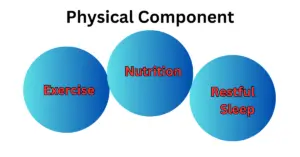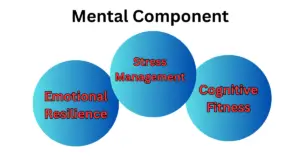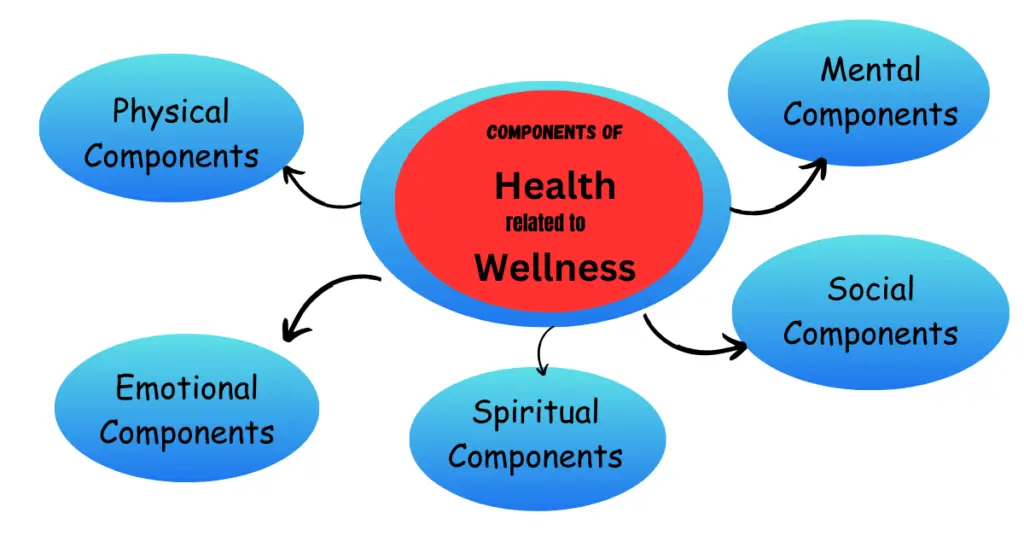Learn how the components of health, including nutrition and exercise, are intricately related to overall wellness. Explore comprehensive insights to optimize your health journey.
Contents
How the Components of Health Are Related to Wellness
In today’s fast-paced world, achieving true wellness has become a priority for many. But what exactly is fitness, and what are its different health-related components? In this informative article, we will delve deep into the intricacies of health and wellness, exploring how physical, mental, and social aspects intersect to create a harmonious state of being. Join us on this journey towards a healthier, more fulfilling life.
In our quest for a balanced and fulfilling life, we often hear the terms “health” and “wellness” interchangeably. However, they are distinct concepts, each comprising various components contributing to our overall state of being. In this article, we will explore the relationship between these components of health and how they are related to wellness.
The Physical Component of Health

Nutrition and Its Impact on Wellness
A balanced diet of essential nutrients is vital for overall health and wellness. Nutrient-dense foods fuel our bodies, enhance immunity, and support optimal functioning. Incorporating fruits, vegetables, lean proteins, and whole grains into your diet can promote longevity and vitality.
Exercise and Its Role in Maintaining Wellness
Regular physical activity is paramount for maintaining optimal health and well-being. Exercise strengthens muscles and bones, boosts mood, reduces stress, and improves sleep quality. Whether it’s brisk walking, cycling, or yoga, finding an activity you enjoy is critical to staying active and healthy.
Restful Sleep
Quality sleep is often underestimated but plays a crucial role in physical health. During sleep, our bodies repair and regenerate, ensuring optimal cognitive function and emotional well-being. Aim for 7-9 hours of restful sleep each night to support your overall wellness.
The Mental Component of Health

Stress Management Techniques
Chronic stress can take a toll on both physical and mental health. Learning effective stress management techniques such as deep breathing, meditation, and mindfulness can help alleviate stress and promote relaxation.
Emotional Resilience as Components of Health
Emotional health is another component closely tied to wellness. Building emotional resilience allows us to navigate challenges with grace and adaptability. Cultivating solid relationships, seeking therapy when needed, and practicing self-compassion are all steps toward achieving emotional well-being.
Cognitive Fitness
Maintaining cognitive health is vital for overall wellness, especially as we age. Brain-stimulating activities like puzzles, reading, or learning new skills can help preserve mental function and enhance the quality of life.
The Emotional Component of Health
Building Emotional Resilience
Emotional resilience refers to the ability to adapt to challenges and bounce back from adversity. Cultivating resilience through positive coping strategies, self-reflection, and seeking social support can enhance emotional well-being.
Practices for Emotional Well-being
Engaging in activities that bring joy and fulfillment, such as hobbies, creative pursuits, and spending time with loved ones, can nurture emotional well-being. Prioritizing self-care and setting boundaries are also crucial for maintaining emotional balance.
The Social Component of Health

The Power of Social Connections
Strong social connections are fundamental to overall health and wellness. Building and nurturing supportive relationships with friends, family, and community members can provide a sense of belonging and emotional support during challenging times.
Community Involvement and Health Benefits
Getting involved in community activities, volunteering, and participating in group events can have significant health benefits. Connecting with others fosters a sense of purpose, reduces feelings of isolation, and promotes mental well-being.
Communication Skills as Components of Health
Social health is fundamentally dependent on effective communication. Developing good communication skills can improve our relationships, reduce conflicts, and enhance our ability to connect with others on a deeper level.
The Spiritual Component of Health
Exploring Spiritual Practices
Spirituality encompasses beliefs, values, and practices that give meaning and purpose to life. Engaging in spiritual practices such as meditation, prayer, or time in nature can nurture inner peace and spiritual well-being.
Finding Meaning and Purpose
Finding meaning and purpose in life is essential for overall well-being. Whether through personal growth, contributing to society, or pursuing meaningful relationships, aligning with one’s values and passions can bring fulfillment and joy.
Bringing It All Together
Summarizing how the components of health are related to wellness reveals a complex and interconnected web. Physical health provides the foundation, ensuring we have the energy and vitality to pursue our goals. Mental health equips us with the resilience and cognitive fitness needed to navigate life’s challenges. Social health fosters connections and a sense of belonging, enriching our lives with meaningful relationships.
By nurturing each of these components, we can achieve a state of holistic wellness that encompasses not only the absence of illness but also a deep sense of fulfillment and vitality.
FAQs on Components Of Health
Q. How do the five components relate to health and wellness?
The five components—physical, mental, emotional, social, and spiritual—are interrelated and collectively contribute to overall health and wellness. Physical health encompasses nutrition, exercise, and disease prevention, while mental health involves cognitive function, emotional well-being, and stress management.
Emotional health involves understanding and managing emotions, fostering resilience, and cultivating positive relationships. Social health pertains to interpersonal connections, support networks, and community engagement. Lastly, spiritual health involves finding meaning, purpose, and inner peace. These components create a holistic framework for achieving optimal health and wellness.
Q. How is wellness related to health?
Wellness encompasses a broader concept than health, including physical well-being and mental, emotional, social, and spiritual aspects of life. While health primarily focuses on the absence of illness or disease, wellness emphasizes proactive strategies to enhance overall quality of life and vitality. Thus, wellness is closely related to health but extends beyond it by promoting a balanced and fulfilling lifestyle that nurtures all dimensions of well-being.
Q. What is the relationship between health and well-being?
Health and well-being are intricately connected, with well-being encompassing a broader concept that goes beyond physical health. While health refers to being free from illness or injury, well-being encompasses various dimensions of life satisfaction, fulfillment, and flourishing. Achieving optimal health contributes to overall well-being, but well-being also encompasses mental, emotional, social, and spiritual aspects beyond physical health.
Q. What are the factors related to wellness?
Several factors contribute to wellness, including lifestyle choices, environmental influences, social support, access to healthcare, genetics, and socioeconomic status. Regular physical activity, maintaining a balanced diet, managing stress effectively, fostering positive relationships, and pursuing activities that bring joy and fulfillment are essential for promoting wellness. Additionally, factors such as access to healthcare services, safe living conditions, and socioeconomic opportunities play a crucial role in influencing overall well-being.
Q. Is wellness a component of health?
While wellness is closely related to health, it is not merely a component but a broader concept encompassing various dimensions of well-being beyond physical health. Health primarily focuses on the absence of illness or disease, whereas wellness emphasizes proactive strategies to enhance overall quality of life and vitality. Wellness encompasses physical, mental, emotional, social, and spiritual aspects of life, making it a comprehensive framework for promoting optimal well-being.
Q. What are the four types of health that relate to wellness?
The four types of health-related to wellness are physical health, mental health, emotional health, and social health. Physical health encompasses aspects such as nutrition, exercise, and disease prevention. Mental health involves cognitive function, emotional well-being, and stress management. Emotional health pertains to understanding and managing emotions, fostering resilience, and cultivating positive relationships. Social health involves interpersonal connections, support networks, and community engagement. Together, these types of health contribute to overall wellness and vitality.
Q. What are the three major components of health and wellness?
The three significant health and wellness components are physical, mental, and social/spiritual health. Physical health involves aspects such as nutrition, exercise, and disease prevention. Mental health encompasses cognitive function, emotional well-being, and stress management. Social/spiritual health pertains to interpersonal connections, support networks, community engagement, and finding meaning and purpose in life. These components work together to promote holistic well-being and overall quality of life.
Q. What is the most critical component of health and wellness, and why?
It is challenging to pinpoint the most critical component of health and wellness, as each dimension—physical, mental, emotional, social, and spiritual—plays a vital role in overall well-being. However, mental health is often crucial because it influences how individuals perceive, interpret, and respond to life’s challenges. A healthy mind contributes to resilience, emotional well-being, and adaptive coping strategies, essential for navigating modern life’s complexities and achieving a balanced and fulfilling lifestyle.
Q. What are the health-related components?
Health-related components encompass various aspects of well-being, including physical fitness, nutrition, disease prevention, mental health, emotional well-being, social connections, and spiritual fulfillment. These interconnected components influence each other, highlighting the importance of adopting a holistic approach to health and wellness. By addressing all aspects of health, individuals can optimize their well-being and lead healthier, more fulfilling lives.
Conclusion
However, achieving optimal health and wellness requires a holistic approach that addresses well-being’s physical, mental, emotional, social, and spiritual components. Individuals can cultivate a balanced and fulfilling life by prioritizing nutrition, exercise, stress management, emotional resilience, social connections, and spiritual practices.
Read more articles on Health and Wellness.
You might like to read:
12 Steps to Master Your Money and Achieve Financial Well-being



